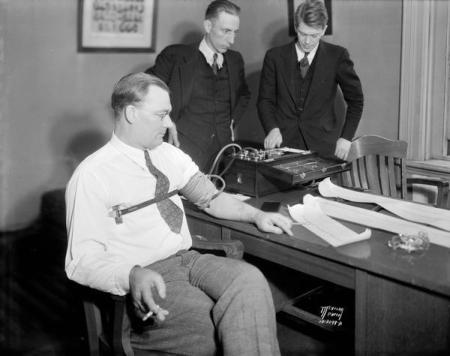Thursday, January 29: Femme Fatale
IT’S ALL LIES
by Deborah Elliott-Upton

Every day criminals are caught and herded off in handcuffs past family and friends to a waiting patrol car amid cries of “You’ve got the wrong man!” And every day, people are proved wrong when police produce evidence with or without the aid of a confession.
“Who knows what evil lurks in the hearts of men?” —The Shadow (radio program)
“Every murderer is probably somebody’s old friend,” observed Poirot philosophically. “You cannot mix up sentiment and reason.” —Agatha Christie, The Mysterious Affair at Styles
Great characters hide their secrets until the end of the story. It is skillful dropping of clues like Hansel and Gretel’s breadcrumbs that keep us interested to the tale’s resolution. I agree with the genius of Shrek’s simple words: “We have layers.” A good writer peels away those layers as deliberately timed as a choreographed striptease until the dark soul of the villain is revealed.
In fiction nice guys don’t always finish last, but sometimes they quite surprisingly turn out to be the bad guy. The originally-thought bad guy may prove a bit heroic in the end. The writer’s challenge is to make neither too stereotypical or predictable. Nothing is more boring than a predictable ending. Boring sometimes means losing a reader forever more.
“If you lived in London, where the whole system is one of false good-fellowship, and you may know a man for twenty years without finding out that he hates you like poison, you would soon have your eyes opened. There we do unkind things in a kind way: we say bitter things in a sweet voice: we always give our friends chloroform when we tear them to pieces.” —George Bernard Shaw, “You Never Can Tell”
When planning a character’s part in a story — especially the villain — I consider why he is doing whatever it is he’s doing. Was he tormented as a child? Did he lose his true love to another or his fortune to a huge conglomerate? Knowing the character’s background feels like he’s a family friend we haven’t seen in a while. The reader will piece in the background with what the author shares, but sometimes it is the reading between the lines that makes the connection and what gives the character life.
“ … I feel certain that his tale is true. Feeling that certainty, I befriend him. As long as that certainty shall last, I will befriend him. And if any consideration could shake me in this resolve, I should be so ashamed of myself for my meanness, that no man’s good opinion — no, nor no woman’s — so gained, could compensate me for the loss of my own.” —Charles Dickens, The Mystery of Edwin Drood
In the movie, “Appaloosa,” Allison French says, “Everybody lies.” I imagine there may be some people who profess they don’t, but I’m not sure even the clergy don’t tell a white lie at least occasionally. Except for Pollyanna, I’d bet that almost all fictional characters lie — even our heroes. Maybe they lie for a good reason. Maybe they lie just because they can get away with it. Maybe their lie saves someone’s life. It doesn’t matter if it makes for better drama.
Criminals hide their secrets behind lies. They’re probably calculated lies and assuredly most of them don’t get away with the lies forever, but humans make mistakes. So, how well do we really know the next door neighbor? Mine’s beginning to look a little suspicious.




















House also says “Everybody lies”. I’m thinking there is much truth to that! LOL. Great column this week, as always.
I love House, Lissa. There is a new series call Lie to Me. It is about the science of detecting a lie. I like it.
Great article. Food for thought.
Just a mystery question to counter why the “villian” does what he/she does….is there ever a good reason? To lie? To do things some consider “bad” but might be justified?
For the first time in years I actually have close neighbors and I’m pretty sure they are all axe murderers and pedophiles.
Not really but moving in from the country has been an eye opening experience.
Just a mystery question to counter why the “villian” does what he/she does….is there ever a good reason? To lie? To do things some consider “bad” but might be justified?
In my opinion, everyone believes they are “right” in their actions most of the time. Sure, we may get a queasiness in our gut when we know we aren’t being on the up and up, but usually we can rationalize that away. A villain probably thinks he has reaspn to “get back” at the victim, whether it is someone he knows personally, a random someone who reminds him of the one who done him wrong or a conglomerate he blames for stealing his 401K. As a writer (and a reader), I want to know why he acts as he does.